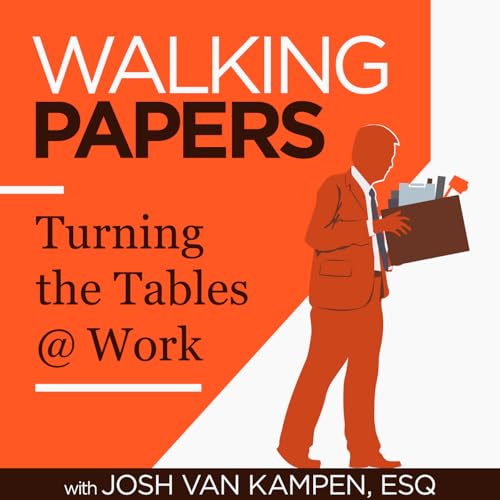Josh Van Kampen, founder of the boutique employment law firm Van Kampen Law, PC, isn’t afraid to sound superficial. It’s just part of his business.
“It's important for your lawyer to have a nice office, because you're likely to be conducting mediations and depositions in that office, and if the office exudes accomplishment, and if their firm is successful, then you're breaking the mold,” he says in this episode of The Walking Papers podcast.
“So, when their general counsel walks in the door, and they walk into a nice office, and they're saying, ‘This firm is different,’ it actually is important.”
In this episode, he discusses the first steps anyone should take when seeking an employment lawyer, and why shopping around for the right fit is similar to picking the right car: you shouldn’t just go for the first, cheapest model you find. You need to do some background research and make sure you know their experience and their accomplishments — understand what their rate says about them.
He also says it’s okay to be picky based on otherwise superficial elements such as a firm’s website or office, because how they present themselves is often a reflection of their level of professionalism and level of care.
💡 Key Ideas 💡Lessons learned on this episode
★ Doing your research is always key — Both the lawyer and the client need to go into a consultation prepared. If the lawyer seems uninterested and doesn’t bring any background to the table, that’s just as bad as you as the client coming in and not having enough information for a proper case.
★ Sometimes judging a book by its cover is OK — When you’re shopping around for a lawyer, it’s smart to pass on the firm with an outdated website with few resources, just like it’s OK to pass on the firm based in a dingy strip mall that’s equally seedy on the inside. Lawyers who have put time into making their website a modern resource and effort into making their office a relaxing environment are more likely to be successful lawyers.
★ You get what you pay for — It’s a cliche, but when it comes to finding a good lawyer, Josh says it’s absolutely true: There’s no such thing as a free consultation if it’s a busy, successful firm — so think twice before meeting with someone who isn’t asking you to pay for their time.
⚡ Episode Highlights ⚡[2:42] Shop around: Josh discusses the importance of being picky when it comes to choosing your employment lawyer. He also outlines what he does and how his boutique firm uses its resources to help low-income clients by doing things such as fronting costs.
[8:03] First steps: Josh explains why the first thing you should do is connect with friends and family members who either are lawyers or know lawyers. Then, he explains why it’s fair to judge a firm by its website.
[12:43] Breaking the mold: Josh discusses his favorite phrase a little further and explains how it relates to a lawyer’s office and the importance of a relaxed environment that exudes accomplishment.
[16:01] Did they do their homework?: Josh explains why, whenever you’re walking into a consultation with a lawyer, it’s important that they’ve done their research on your case.
[20:41] Know your story: Josh discusses why you as a client need to be prepared for that first meeting as well because “doing your homework” goes both ways.
📨 Get in Touch 📨The Walking Papers is a bi-weekly podcast by Van Kampen Law, a plaintiff-side employment law firm based out of...
 27 mins
27 mins Feb 1 202118 mins
Feb 1 202118 mins 25 mins
25 mins 24 mins
24 mins 24 mins
24 mins Dec 2 202019 mins
Dec 2 202019 mins 22 mins
22 mins 23 mins
23 mins
